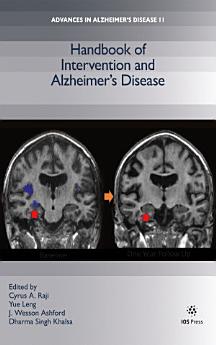Handbook of Intervention and Alzheimer’s Disease
Yue Leng · J. Wesson Ashford · Dharma Singh Khalsa
Feb 2024 · Advances in Alzheimer's Disease Book 11 · SAGE Publications Limited
Ebook
766
Pages
family_home
Eligible
info
reportRatings and reviews aren’t verified Learn More
About this ebook
It is almost 120 years since Alzheimer’s disease (AD) was first reported, and the concept of managing some of the modifiable risk factors associated with the disease has been present from the outset. Intervening to manage risk factors as a way of tackling AD is not new, but optimizing brain health as a way of minimizing risk and maximizing the potential benefits of revolutionary new treatments for AD is becoming increasingly important. This book, the Handbook of Intervention and Alzheimer’s Disease, presents 47 papers exploring factors which may either inspire or inform future treatment and clinical trials. While novel interventions such as anti-amyloid immunotherapy present great opportunities, they may also increase the risk of brain bleeds and edema, which in turn may lead to adverse clinical outcomes. Such adverse outcomes are demonstrably more likely to occur in persons with poor brain health, so improved management of the risk factors which make up the AD preventome will also minimize the risks associated with such novel therapies. The papers in this volume can therefore be thought of as offering insight into those factors that can optimize brain health or providing key insights into interventions which may achieve such outcomes. Together with its companion volume on prevention, the book provides a comprehensive overview of strategies for tackling Alzheimer’s disease, and will be of interest to all those working in the field. Cover illustration: Improved hypoperfusion (resolving blue colors) on ASL MRI Z-score maps superimposed on structural MRI scans at baseline and one year in a PET amyloid-positive research participant with cognitive complaints undergoing one year of multi-domain personalized brain health interventions (vascular disease management, dietary optimization, sustained physical activity etc.). Permission to use this figure was granted both by the study P.I. Dr. David Merrill, MD, PhD, of the Pacific Neuroscience Institute and the research participant.
Rate this ebook
Tell us what you think.
Reading information
Smartphones and tablets
Install the Google Play Books app for Android and iPad/iPhone. It syncs automatically with your account and allows you to read online or offline wherever you are.
Laptops and computers
You can listen to audiobooks purchased on Google Play using your computer's web browser.
eReaders and other devices
To read on e-ink devices like Kobo eReaders, you'll need to download a file and transfer it to your device. Follow the detailed Help Center instructions to transfer the files to supported eReaders.







